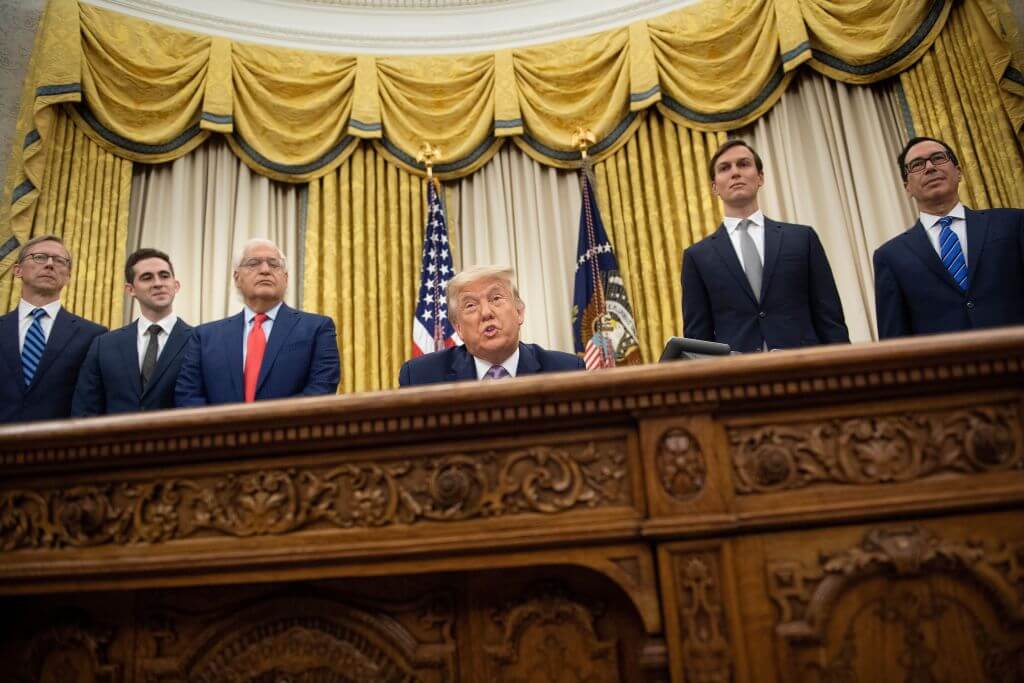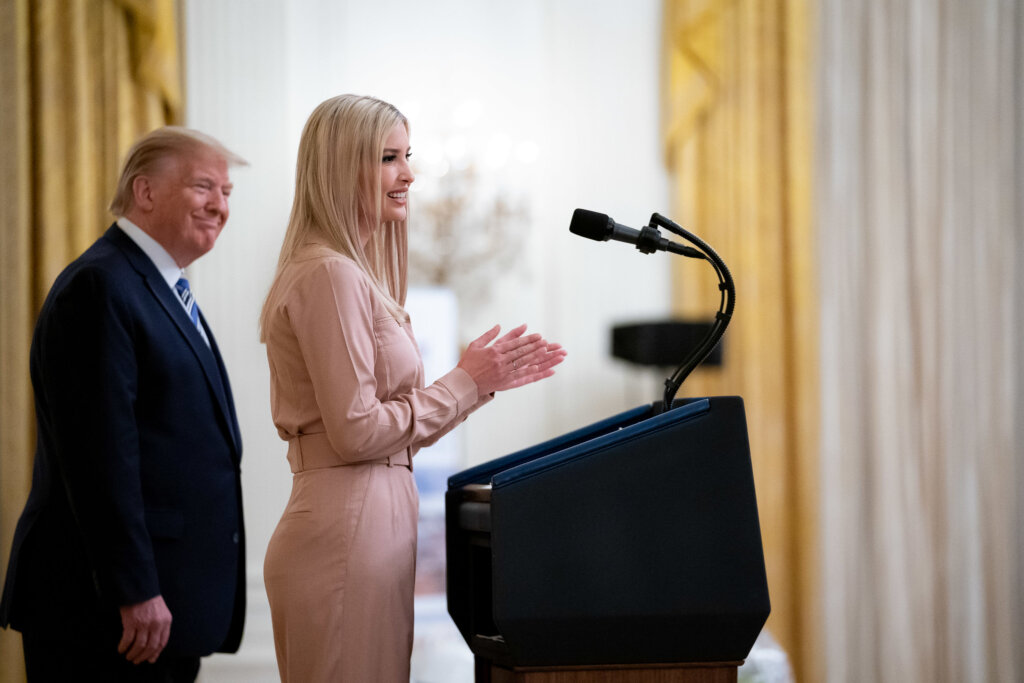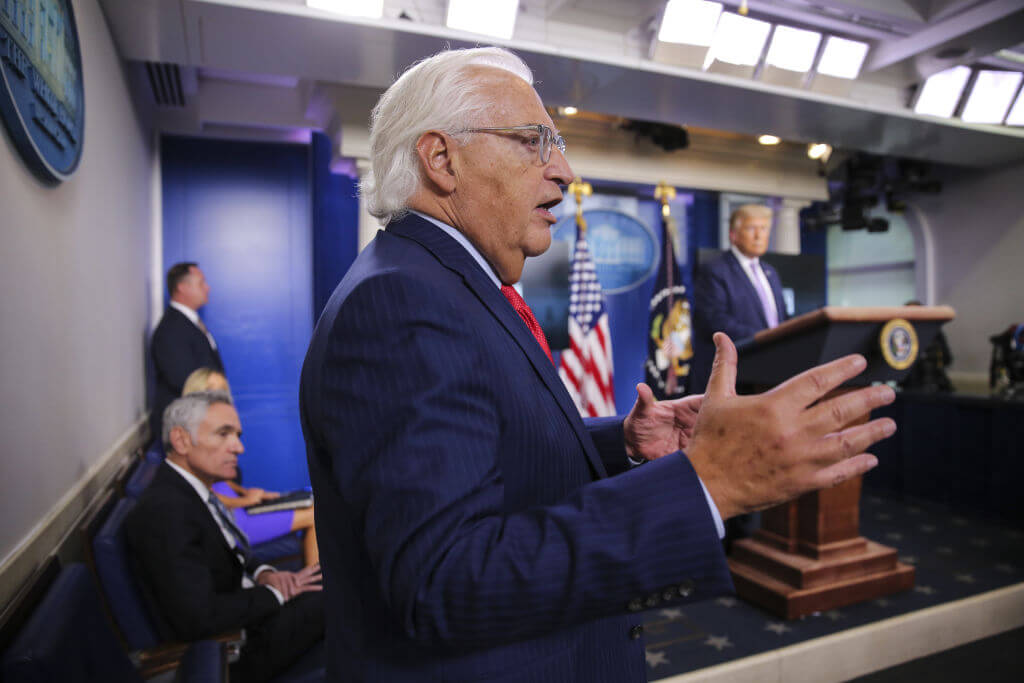‘I’m here with my two Jewish lawyers’: How Trump was pushed to disavow David Duke
In new book, veteran reporter Maggie Haberman highlights Donald Trump’s ‘uncertainty’ about disassociating himself from the nation’s most famous white supremacist

David Friedman, then-U.S. ambassador to Israel, seated left of former President Donald Trump on Aug. 13, 2020. Photo by BRENDAN SMIALOWSKI/AFP via Getty Images
Former President Trump bragged about the Jews who worked for him but was quick to denigrate Jewish observances and slow to disavow his antisemitic supporters, according to a new book by New York Times reporter Maggie Haberman.
“He was usually selling, saying whatever he had to in order to survive life in ten-minute increments,” Haberman writes in the highly anticipated book, titled “Confidence Man: The Making of Donald Trump and the Breaking of America.” The Forward obtained an advance copy of the book, which is set to be published on Tuesday.
Haberman, 48, owns the Trump beat after years of covering the outspoken real-estate mogul for the New York Post, the New York Daily News and Politico. Her reporting on Trump — from the moment he descended a Trump Tower escalator to announce his candidacy in June 2015 through his presidency — earned her a share in the 2018 Pulitzer Prize for national reporting.
‘What do you need me to say?’
The book reveals that as much as Trump projects toughness and strength, he is very much a people-pleaser. Haberman details a phone call she received from the then-presidential candidate, giving her an exclusive statement disavowing derogatory comments from former Ku Klux Klan grand wizard David Duke about Jews who opposed Trump. The Anti-Defamation League had pressured Trump to distance himself from Duke, who had fervently supported Trump’s political rise.
Haberman writes that she was in the back of a yellow taxi cab riding down Fifth Avenue when Trump called her. She had wanted him to comment about additional support he had received from Duke. “I’m here with my two Jewish lawyers,” Trump told Haberman, referring to David Friedman and Jason Greenblatt, two longtime employees who served as informal advisers on Jewish issues. He then read a statement to her: “Antisemitism has no place in our society, which needs to be united, not divided.” It was followed by a long pause, Haberman writes.
“That’s it?” she asked.
After a brief pause, Trump responded, “What do you need me to say?”
The “uncertainty” about disassociating himself from the nation’s most famous white supremacist “threw me,” Haberman writes.
After realizing his initial statement was lacking, Trump then added that he “totally disavows” what Duke said and hung up the phone.
The book reveals that following the controversy that ensued after Trump’s “both sides” response to the 2017 deadly “Unite the Right” rally in Charlottesville, Ronald Lauder, president of the World Jewish Congress and a longtime friend and advisor to the president, urged him “to take a different tone” in speaking about the events in Charlottesville. “Say you misspoke,” Lauder reportedly told Trump.
“‘Don’t go there,’ Trump replied angrily,” Haberman writes.
‘My Jewish’ aides
Haberman writes that during the 2020 presidential campaign, after recovering from COVID-19, Trump turned to a number of senior aides who were accompanying him on Air Force One, including his son-in-law Jared Kushner and speechwriter Stephen Miller, and boasted about the number of Jews working for him.
“Who would have thought my top guys are Jews,” Trump told the group of staffers.
According to Haberman, Trump frequently misidentified one of his close communication advisers, Jason Miller, as Jewish due to his surname, and complimented him on his “sweet, understanding Jewish wife,” Kelly Miller. Neither Jason or Kelly Miller is Jewish.
When Jason Miller corrected Trump, the former president expressed surprise. “Wow, so only your wife is,” he said.

When Trump’s daughter Ivanka converted to Judaism in 2009, Trump reportedly told his friends, “Can you believe I have a Jewish daughter?”
Yet despite his purported affinity for Jews, Trump didn’t appreciate Jewish observances when inconvenient for him. “Fucking Shabbat,” Trump groused during the 2016 election when Kushner, who is Orthodox, was not available to talk on the phone about how the campaign was going in Florida, Haberman writes, “asking no one in particular if his Jewish son-in-law was really religious or just avoiding work.”
In an interview with Haberman, Trump denied saying it.
The book also looks back at Trump’s rise in New York City and feuds with local politicians over property and developments. It mentions a 1976 New York Times article, in which Trump boasted to representatives of the National Jewish Hospital in Denver, “Most people think my family is Jewish because we own so many buildings in Brooklyn.” In 1988, Trump referred to Ruth Messinger, then a Jewish member of the City Council opposing a deal that would sell his Upper West Side rail yards land, as “Ruthie” and used “misogynistic terms and caricatures about the way Jewish people look,” according to Haberman’s account.
The sole decider
Haberman writes that Trump was the sole decider in appointing his longtime attorney David Friedman as ambassador to Israel, despite his limited diplomatic experience. Trump then “dispatched” his spokesman Sean Spicer to inform his newly picked secretary of state, Rex Tillerson, about Friedman’s appointment.

Friedman’s direct access to Trump resulted in a dramatic shift in the U.S. approach to the Middle East, including the decision to move the U.S. embassy from Tel Aviv to Jerusalem.
Haberman quotes a confidant to former Israeli Prime Minister Benjamin Netanyahu, who credited the move to “David Friedman’s brains, Sheldon Adelson’s money, and Trump’s balls.”
Adelson, who was the largest single donor for Trump in the presidential election, demanded that Trump announce the relocation of the embassy when he was elected president.
















